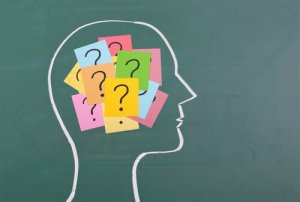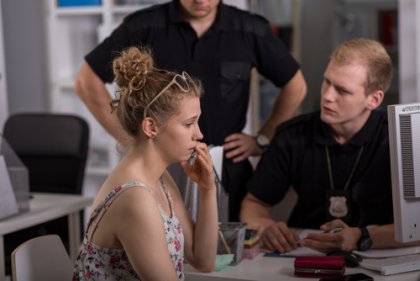What Witnesses Remember: The Quality of Memories

Your memory can betray you. Memories are very far from being a faithful re-creation of reality. When you tell a story about something that happened, you tell it differently every time. In fact, forensic psychologists ask witnesses not to tell anyone about what happened in an attempt not to contaminate their memories. It’s interesting how our minds work, and it’s especially interesting how witness memory works. Is it possible to remember something that didn’t happen?
Eyewitness testimony is the set of knowledge and research with which experts try to establish the quality of the testimony that eyewitnesses provide. Many authors have contributed to this field, which is relevant in the judicial and forensic world.
Reconstructive hypothesis
Elisabeth Loftus, a mathematician and psychologist, believes that memories can be manipulated. Consequently, it’s possible to “introduce” false memories using the power of suggestion. In fact, she believes that eyewitness memory is reconstructed. Why is that?

When someone witnesses an event, they store two types of information. On one hand, the information that they gathered from witnessing the event itself. On the other hand, the information that they gathered after the event. The two types of information combine and give rise to the phenomenon of reconstruction. The witness can end up recalling details of the event that they didn’t actually see. The opposite is also true: they can forget things that they did see.
“Why are memories reconstructed? Because the brain hates a vacuum.”
-Scott Fraser-
Primary factors that affect the accuracy of eyewitness testimony
When a person witnesses a crime, you have to keep several things in mind. The testimony will vary depending on whether or not a memory is considered more or less accurate and, as such, more or less valuable.
Suspicious testimony
Normally, a person usually only manages to register 20% of what they see. In the case of eyewitnesses, this percentage is even lower. That is because the eyewitness was not expecting the thing to happen and the incident usually happens very quickly.
During these moments, there is also the “change blindness” effect. We’re not capable of seeing changes that happen in a person’s surroundings. That’s because we don’t pay attention to the changes. Even though it might be something relevant, we don’t focus on the details. Instead, we see only the big picture (it was a robbery, a theft, he had a gun, etc…). We make the kinds of mistakes that are absolutely crucial in eyewitness testimony.
Prior expectations
There are many studies that show that what we remember isn’t limited to what we directly witness. It also takes into account our expectations. In other words, the knowledge and content of what we’ve acquired from other experiences prior to the event also come into play (Bransford and Franks, 1971).
Bartlett explains this idea of what we expect to see with his theory of reconstructive memory. In his research, he showed that the reader’s reproductions of the famous story “War of the Ghosts” changed the original version. These distortions were due to an oversimplification, an omission of details, and changing some details for the subject’s own details.
Leading questions
Witnesses might change the nature of their memories due to what happens after they observe the crime. In fact, the kinds of questions that the eyewitness has to answer have a big influence on what they remember. However, the silver lining is that the differences are usually small or minor details that don’t significantly influence the consequences of a testimony.

Individual differences
In the analysis of witness memory, experts find that children and the elderly are more likely to distort memories. Children are less exact. The elderly are more convinced by THEIR truth. In other words, they believe in the veracity of their false memories.
The age of the witness can also create a bias. When identifying the guilty party, people are more accurate if the age difference between the witness and the suspect is small.
Eyewitness confidence
In general, the confidence that the eyewitness displays when they identify the suspect is not a good predictor of the accuracy of their testimony. No matter how many details they remember, the emotion they show or their conviction aren’t usually synonymous with truth-telling.
Situational factors
In general, average activation levels are the best for remembering things accurately. If the subject feels stressed or anxious, they will have more trouble remembering.
Likewise, eyewitness testimony confirms that violent events make more of an impression than nonviolent ones. The way that eyewitnesses focus on weapons is especially interesting. Witnesses pay so much attention to an aggressor’s weapon that it reduces their field of attention. They fail to see other details. Violence makes eyewitnesses have a clearer memory of the central experience (the gun). In turn, they have a fuzzier memory of the peripheral details.
We often have a blind faith in our ability to perceive everything that happens around us. However, we are frequently incapable of noticing changes in our surroundings. As a result, our memories are fragile. Eyewitness testimony is a good example of that fragility.
Your memory can betray you. Memories are very far from being a faithful re-creation of reality. When you tell a story about something that happened, you tell it differently every time. In fact, forensic psychologists ask witnesses not to tell anyone about what happened in an attempt not to contaminate their memories. It’s interesting how our minds work, and it’s especially interesting how witness memory works. Is it possible to remember something that didn’t happen?
Eyewitness testimony is the set of knowledge and research with which experts try to establish the quality of the testimony that eyewitnesses provide. Many authors have contributed to this field, which is relevant in the judicial and forensic world.
Reconstructive hypothesis
Elisabeth Loftus, a mathematician and psychologist, believes that memories can be manipulated. Consequently, it’s possible to “introduce” false memories using the power of suggestion. In fact, she believes that eyewitness memory is reconstructed. Why is that?

When someone witnesses an event, they store two types of information. On one hand, the information that they gathered from witnessing the event itself. On the other hand, the information that they gathered after the event. The two types of information combine and give rise to the phenomenon of reconstruction. The witness can end up recalling details of the event that they didn’t actually see. The opposite is also true: they can forget things that they did see.
“Why are memories reconstructed? Because the brain hates a vacuum.”
-Scott Fraser-
Primary factors that affect the accuracy of eyewitness testimony
When a person witnesses a crime, you have to keep several things in mind. The testimony will vary depending on whether or not a memory is considered more or less accurate and, as such, more or less valuable.
Suspicious testimony
Normally, a person usually only manages to register 20% of what they see. In the case of eyewitnesses, this percentage is even lower. That is because the eyewitness was not expecting the thing to happen and the incident usually happens very quickly.
During these moments, there is also the “change blindness” effect. We’re not capable of seeing changes that happen in a person’s surroundings. That’s because we don’t pay attention to the changes. Even though it might be something relevant, we don’t focus on the details. Instead, we see only the big picture (it was a robbery, a theft, he had a gun, etc…). We make the kinds of mistakes that are absolutely crucial in eyewitness testimony.
Prior expectations
There are many studies that show that what we remember isn’t limited to what we directly witness. It also takes into account our expectations. In other words, the knowledge and content of what we’ve acquired from other experiences prior to the event also come into play (Bransford and Franks, 1971).
Bartlett explains this idea of what we expect to see with his theory of reconstructive memory. In his research, he showed that the reader’s reproductions of the famous story “War of the Ghosts” changed the original version. These distortions were due to an oversimplification, an omission of details, and changing some details for the subject’s own details.
Leading questions
Witnesses might change the nature of their memories due to what happens after they observe the crime. In fact, the kinds of questions that the eyewitness has to answer have a big influence on what they remember. However, the silver lining is that the differences are usually small or minor details that don’t significantly influence the consequences of a testimony.

Individual differences
In the analysis of witness memory, experts find that children and the elderly are more likely to distort memories. Children are less exact. The elderly are more convinced by THEIR truth. In other words, they believe in the veracity of their false memories.
The age of the witness can also create a bias. When identifying the guilty party, people are more accurate if the age difference between the witness and the suspect is small.
Eyewitness confidence
In general, the confidence that the eyewitness displays when they identify the suspect is not a good predictor of the accuracy of their testimony. No matter how many details they remember, the emotion they show or their conviction aren’t usually synonymous with truth-telling.
Situational factors
In general, average activation levels are the best for remembering things accurately. If the subject feels stressed or anxious, they will have more trouble remembering.
Likewise, eyewitness testimony confirms that violent events make more of an impression than nonviolent ones. The way that eyewitnesses focus on weapons is especially interesting. Witnesses pay so much attention to an aggressor’s weapon that it reduces their field of attention. They fail to see other details. Violence makes eyewitnesses have a clearer memory of the central experience (the gun). In turn, they have a fuzzier memory of the peripheral details.
We often have a blind faith in our ability to perceive everything that happens around us. However, we are frequently incapable of noticing changes in our surroundings. As a result, our memories are fragile. Eyewitness testimony is a good example of that fragility.
This text is provided for informational purposes only and does not replace consultation with a professional. If in doubt, consult your specialist.







